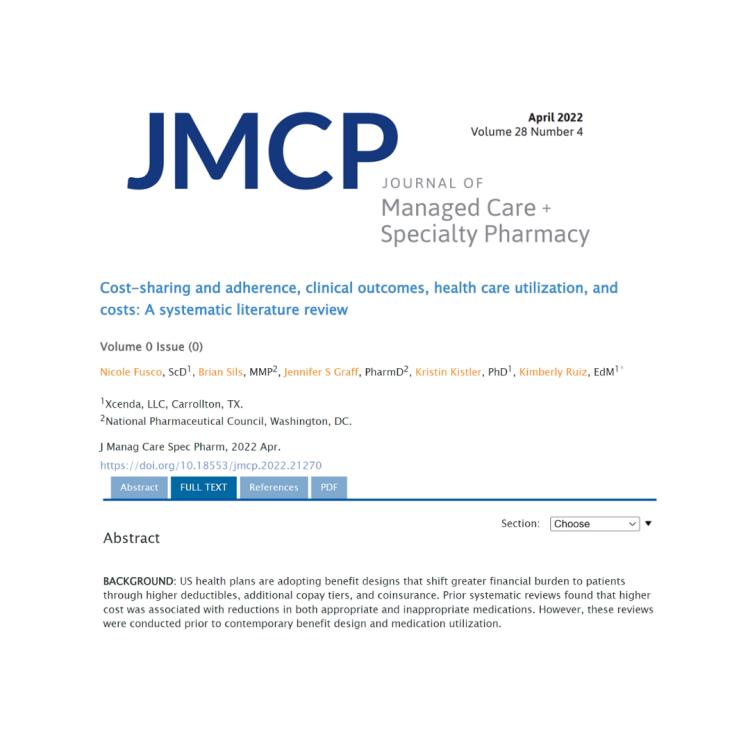Authors
Nicole Fusco, Kristin Kistler, Brian Sils, Jennifer S Graff, Kimberly Ruiz
Publication
Journal of Managed Care and Specialty Pharmacy, April 2022
Higher patient cost-sharing for prescription medications leads to worse medication initiation, adherence, persistence, and discontinuation, according to a new systematic literature review by researchers from the National Pharmaceutical Council (NPC) and Xcenda.
U.S. health insurance plans are increasingly adopting benefit designs that shift greater financial burden to patients through cost-sharing measures such as higher deductibles, copays, and coinsurance. The goal of increased patient cost-sharing is to reduce the use of unnecessary health care goods and services and ultimately decrease health care costs. However, the impact of this financial shift on patient health outcomes has not been adequately characterized to date.
To examine this issue, researchers from NPC and Xcenda conducted a systematic literature review examining the available evidence regarding patient cost-sharing for prescription medications and four outcomes: medication adherence, health care resource utilization, clinical outcomes and health care costs.
Medication Adherence
- The majority of publications reviewed found that increased patient cost-sharing was associated with worse medication adherence (84% of studies), persistence (79% of studies), or discontinuation (58% of studies).
-
The greater the magnitude of cost-sharing, the worse the adherence outcomes. This association persisted regardless of the condition, patient population or type of cost-sharing.
-
-
Six of nine (67%) studies found that increased cost-sharing was associated with decreased medication initiation.
Health Care Resource Utilization
-
Some evidence suggests that increased cost-sharing was also associated with increased inpatient utilization and decreased outpatient utilization.
-
Two of three studies (67%) found a significant decrease in outpatient utilization associated with higher cost-sharing.
-
Four of six studies (67%) found a significant increase in inpatient hospital utilization associated with higher cost-sharing.
-
No significant association was observed between higher cost-sharing and emergency department visits.
-
Clinical Outcomes
-
Little published data was available on the relationship between prescription medication cost-sharing and clinical outcomes.
Health Care Costs
-
Limited evidence suggested that increased patient cost-sharing for prescription medications was associated with decreased insurer-paid pharmacy costs but had an overall neutral to negative effect on total health care costs.
This review supports the hypothesis that increased patient cost-sharing negatively impacts medication adherence and outpatient care, which in turn may result in increased hospitalizations. Using cost-sharing as a tool to curb costs may affect both necessary and unnecessary healthcare use but may not reduce total healthcare costs as intended.
As such, when health care decision-makers design insurance benefits, they should consider a holistic view of patient cost-sharing that includes its impact on patient, clinical, and economic outcomes.
